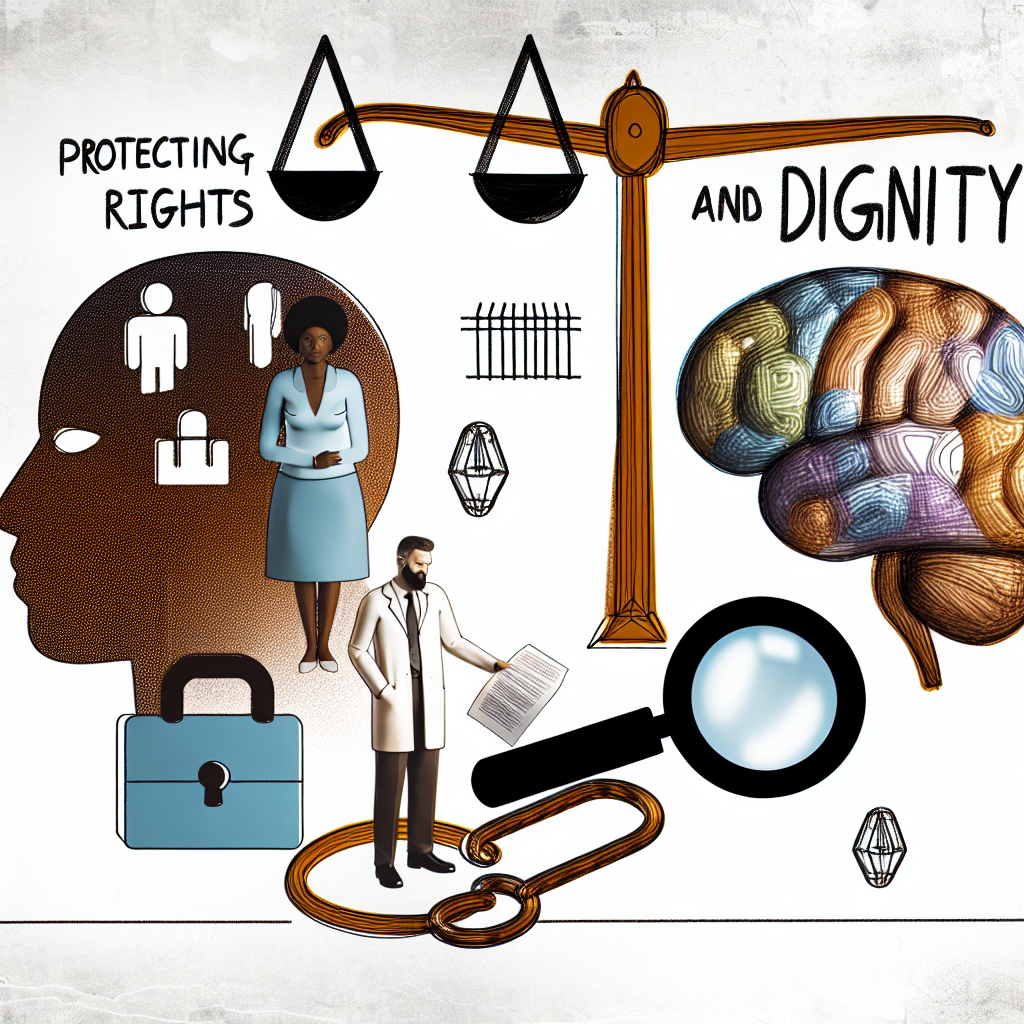
Protecting Rights and Dignity: The Essential Role of Ethics in Psychological Research
Introduction
Imagine a world where psychological research is conducted without ethical considerations. Vulnerable populations could be exploited, misinformation could proliferate, and the sanctity of human dignity could be compromised. Fortunately, we don’t live in such a world—thanks to the robust ethical frameworks in place to ensure research participants’ rights and dignity are upheld. Protecting rights and dignity: the role of ethics in psychological research becomes increasingly paramount as the field continues to evolve. This article delves into the essential role of ethics, grounded in real-world applications and case studies, to elucidate how researchers can navigate the fine line between inquiry and integrity.
The Importance of Ethics in Psychological Research
The essence of psychological research is to explore the human mind and behaviors that shape society. However, the very nature of this inquiry often involves sensitive topics that can impact individuals’ lives significantly. Thus, the ethics governing this research are not just guidelines; they are fundamental principles that protect participants from harm while ensuring the integrity of the research.
Historical Context: A Brief Overview
To comprehend the modern ethical landscape of psychological research, we must first consider historical precedents. Historical abuses in the name of research, such as the infamous Milgram obedience experiments and the Tuskegee Syphilis Study, highlight the necessity of ethical oversight. These cases demonstrate how unchecked experimentation can lead to profound psychological and physical harm, prompting the establishment of ethical guidelines such as those proposed by the American Psychological Association (APA).
Key Principles of Ethical Research
Ethics in psychological research is typically anchored in several key principles:
Respect for Persons: This principle emphasizes the importance of autonomy and informed consent. Researchers must ensure participants are fully aware of the nature, risks, and benefits of the research.
Beneficence: This principle advocates for maximizing benefits while minimizing risks. Research must be designed to enhance the well-being of participants and society.
Justice: The benefits and burdens of research must be distributed fairly. No group should bear excessive risks or be denied reasonable access to the research’s potential benefits.
- Integrity: Researchers must maintain honesty and transparency throughout their work, including reporting data and findings truthfully.
Real-World Case Studies
Case Study 1: The Stanford Prison Experiment
One of the most notable studies in psychology is the Stanford Prison Experiment conducted by Philip Zimbardo in 1971. This landmark experiment aimed to explore the psychological effects of perceived power, focusing on the struggle between prisoners and prison officers. However, the study quickly spiraled out of control, leading to emotional distress among participants.
Analysis: The Stanford Prison Experiment underscores the critical importance of ethics in psychological research. Although it provided valuable insights into human behavior, the lack of oversight and extent of psychological harm led to widespread condemnation and reforms in ethical standards, emphasizing the principle of respect for persons.
Case Study 2: The Azilal Study
A more contemporary example of ethics in psychological research can be seen in the Azilal Study, which aimed to investigate the mental health impact of natural disasters in a Moroccan community. Researchers worked closely with local leaders and community members to ensure that the research design respected cultural norms and involved informed consent.
Analysis: This case illustrates how ethical considerations can enhance research quality and community engagement. By protecting participants’ rights and dignity through cultural sensitivity, researchers not only gathered valuable data but also nurtured trust within the community.
Case Study 3: The Ongoing Relevance of Ethical Oversight
In 2020, as the COVID-19 pandemic surged, research protocols evolved significantly, particularly in addressing mental health issues associated with lockdowns and social isolation. Ethical committees rapidly adapted to oversee studies that could exploit vulnerable populations facing unprecedented challenges.
Analysis: This example highlights the dynamic nature of ethical research. As new challenges arise, ongoing adaptation of ethical guidelines is crucial to protect rights and dignity. Ethical committees continue to play a vital role in evaluating research risks, especially in times of crisis.
Visualizing Ethical Principles
To further articulate the importance of protecting rights and dignity, consider the following table illustrating key ethical guidelines alongside their applications in psychological research:
| Ethical Principle | Description | Application Example |
|---|---|---|
| Respect for Persons | Informed consent, autonomy | Informing participants of research risks |
| Beneficence | Maximize benefits, minimize harm | Implementing safety measures in studies |
| Justice | Fair distribution of risks/benefits | Inclusion of diverse populations |
| Integrity | Honesty in reporting | Transparent dissemination of findings |
Challenges in Upholding Ethics
The Conflict of Interest
Ethical research can face significant challenges, particularly when conflicts of interest arise. Researchers may be pressured by funding sources or institutional objectives that conflict with the imperative to uphold participant rights and dignity.
To combat this, funding transparency and ethical training for researchers are essential to prevent undue influence, fostering a culture where ethical practices are prioritized.
The Complexity of Informed Consent
Informed consent remains a cornerstone of ethical research but can be challenging, especially when dealing with vulnerable populations, such as children or individuals with cognitive impairments. Researchers must navigate these complexities with sensitivity and creativity, ensuring ethical standards are maintained.
The Digital Age Dilemma
With the advent of digital research and data collection, new ethical concerns have emerged regarding privacy, confidentiality, and the use of AI in psychological assessments. As researchers embrace technology, they must remain vigilant to ensure compliance with ethical standards while protecting participants’ rights and dignity.
The Role of Institutional Review Boards (IRBs)
Institutional Review Boards (IRBs) are integral to upholding ethical standards in psychological research. These boards evaluate research proposals to ensure they align with ethical guidelines, safeguarding participant rights and welfare.
The IRB Process: Ensuring Ethical Standards
When researchers submit their proposals to IRBs, several factors are considered:
Risk Assessment: Evaluating potential risks to participants.
Informed Consent Procedures: Ensuring procedures are in place for obtaining participants’ informed consent.
Equitable Selection: Assessing whether participants are chosen fairly, without discrimination.
- Monitoring: Establishing protocols for ongoing monitoring of the study to ensure participants’ rights are upheld.
Conclusion
Protecting rights and dignity: the role of ethics in psychological research is not merely a regulatory burden; it is a fundamental component that enhances the integrity and quality of research. Ethical considerations ensure that participants are respected, protected, and valued, contributing significantly to the credibility of the research outcomes.
While challenges persist, the evolution of ethical standards and frameworks promises a future where psychological research can responsibly explore the complexities of the human mind while safeguarding the dignity of every participant. Researchers, practitioners, and educators are called upon to commit to these ethical principles, paving the way for a more humane and ethically sound landscape in psychological research.
FAQs
1. What are the key ethical principles in psychological research?
The key ethical principles include respect for persons, beneficence, justice, and integrity.
2. Why is informed consent important in psychological research?
Informed consent ensures that participants are aware of the nature of the research, potential risks, and their rights, promoting autonomy and respect.
3. How do Institutional Review Boards (IRBs) contribute to ethical research?
IRBs review research proposals to ensure ethical standards are upheld, safeguarding participant rights and welfare.
4. What challenges do researchers face in maintaining ethical standards?
Researchers may encounter conflicts of interest, complexities in informed consent, and issues related to digital data collection.
5. How has the digital age impacted ethical considerations in psychology?
The digital age introduces new ethical dilemmas regarding privacy, data security, and the ethical use of technology in research.
Through understanding and implementing these principles and practices, the field of psychology can thrive responsibly, ensuring the protection of rights and dignity for all involved in research.


















Some truly excellent posts on this web site, appreciate it for contribution.
Wow! Thank you! I always wanted to write on my blog something like that. Can I take a portion of your post to my website?
I know this if off topic but I’m looking into starting my own blog and was wondering what all is needed to get set up? I’m assuming having a blog like yours would cost a pretty penny? I’m not very internet smart so I’m not 100 positive. Any recommendations or advice would be greatly appreciated. Appreciate it
Thank you for sharing superb informations. Your website is very cool. I am impressed by the details that you have on this web site. It reveals how nicely you understand this subject. Bookmarked this web page, will come back for extra articles. You, my friend, ROCK! I found just the information I already searched all over the place and simply couldn’t come across. What a great website.
Thanks , I have just been searching for info about this subject for ages and yours is the greatest I have discovered so far. But, what about the conclusion? Are you sure about the source?
I always was interested in this subject and stock still am, appreciate it for putting up.
It’s truly a great and helpful piece of information. I’m happy that you shared this useful info with us. Please keep us up to date like this. Thank you for sharing.
Thank you, I have just been searching for information about this topic for a long time and yours is the greatest I have came upon till now. But, what concerning the conclusion? Are you certain about the source?
Fantastic website. A lot of helpful info here. I am sending it to a few buddies ans additionally sharing in delicious. And obviously, thank you to your sweat!
A lot of of what you articulate is supprisingly precise and that makes me wonder why I had not looked at this with this light previously. Your article truly did turn the light on for me as far as this subject goes. However there is 1 issue I am not necessarily too cozy with and while I make an effort to reconcile that with the central idea of your issue, let me see just what the rest of your visitors have to point out.Nicely done.
I like the efforts you have put in this, thanks for all the great articles.
I enjoy your writing style genuinely loving this internet site.
I’m not sure exactly why but this weblog is loading extremely slow for me. Is anyone else having this issue or is it a problem on my end? I’ll check back later on and see if the problem still exists.
I regard something genuinely interesting about your weblog so I saved to bookmarks.
Hiya, I am really glad I’ve found this info. Today bloggers publish only about gossips and internet and this is really frustrating. A good blog with exciting content, this is what I need. Thank you for keeping this web-site, I’ll be visiting it. Do you do newsletters? Cant find it.
very good publish, i actually love this website, carry on it
Greetings! I know this is kinda off topic but I’d figured I’d ask. Would you be interested in exchanging links or maybe guest authoring a blog article or vice-versa? My blog goes over a lot of the same topics as yours and I think we could greatly benefit from each other. If you happen to be interested feel free to shoot me an e-mail. I look forward to hearing from you! Excellent blog by the way!
I like this post, enjoyed this one thank you for posting. “Good communication is as stimulating as black coffee and just as hard to sleep after.” by Anne Morrow Lindbergh.
Some genuinely fantastic information, Gladiola I detected this. “The basis of a democratic state is liberty.” by Aristotle.
I really enjoy examining on this internet site, it holds wonderful articles. “Never fight an inanimate object.” by P. J. O’Rourke.
I have been absent for a while, but now I remember why I used to love this web site. Thanks, I will try and check back more often. How frequently you update your web site?
A formidable share, I just given this onto a colleague who was doing a bit analysis on this. And he in actual fact bought me breakfast because I discovered it for him.. smile. So let me reword that: Thnx for the deal with! However yeah Thnkx for spending the time to discuss this, I feel strongly about it and love studying more on this topic. If potential, as you turn out to be experience, would you thoughts updating your weblog with extra details? It’s extremely helpful for me. Massive thumb up for this blog publish!
A lot of the things you state happens to be supprisingly accurate and that makes me ponder why I had not looked at this with this light before. This piece truly did switch the light on for me as far as this subject goes. But there is actually 1 position I am not too comfy with so while I attempt to reconcile that with the central theme of the issue, let me see just what the rest of the readers have to point out.Well done.
I’m really enjoying the design and layout of your blog. It’s a very easy on the eyes which makes it much more pleasant for me to come here and visit more often. Did you hire out a developer to create your theme? Great work!
Simply wanna remark on few general things, The website pattern is perfect, the subject material is very great : D.
It is truly a great and useful piece of info. I’m satisfied that you simply shared this useful information with us. Please stay us informed like this. Thank you for sharing.
Precisely what I was searching for, thanks for putting up.
I would like to express appreciation to this writer just for rescuing me from this particular dilemma. Because of searching through the online world and obtaining ideas which are not productive, I assumed my life was done. Living without the presence of strategies to the problems you have solved by means of your write-up is a critical case, as well as those which might have badly affected my entire career if I hadn’t noticed your site. Your personal competence and kindness in taking care of all areas was crucial. I don’t know what I would’ve done if I hadn’t encountered such a solution like this. It’s possible to at this moment relish my future. Thank you so much for your professional and result oriented guide. I will not be reluctant to suggest the website to any person who needs and wants guidance about this area.
Hi there, I discovered your site via Google while looking for a comparable topic, your website came up, it appears great. I have bookmarked it in my google bookmarks.
I’m still learning from you, as I’m trying to reach my goals. I certainly love reading all that is posted on your blog.Keep the information coming. I loved it!
Wonderful work! That is the kind of info that should be shared around the net. Disgrace on the search engines for not positioning this put up upper! Come on over and seek advice from my website . Thank you =)
superb post.Ne’er knew this, appreciate it for letting me know.
Hiya, I am really glad I’ve found this info. Nowadays bloggers publish only about gossips and web and this is really frustrating. A good site with exciting content, this is what I need. Thank you for keeping this website, I will be visiting it. Do you do newsletters? Cant find it.
you have an ideal blog right here! would you prefer to make some invite posts on my blog?
Some really prime posts on this site, saved to my bookmarks.
The next time I read a blog, I hope that it doesnt disappoint me as much as this one. I mean, I know it was my choice to read, but I actually thought youd have something interesting to say. All I hear is a bunch of whining about something that you could fix if you werent too busy looking for attention.
Hey There. I discovered your blog using msn. This is a really neatly written article. I will make sure to bookmark it and return to read more of your helpful info. Thanks for the post. I will certainly comeback.
Nice post. I was checking constantly this blog and I am impressed! Extremely helpful information specially the last part 🙂 I care for such info much. I was looking for this particular info for a very long time. Thank you and good luck.
I like what you guys are up too. Such clever work and reporting! Keep up the excellent works guys I have incorporated you guys to my blogroll. I think it will improve the value of my site 🙂
There are some attention-grabbing cut-off dates on this article but I don’t know if I see all of them middle to heart. There’s some validity but I will take maintain opinion till I look into it further. Good article , thanks and we would like more! Added to FeedBurner as nicely
Today, I went to the beachfront with my kids. I found a sea shell and gave it to my 4 year old daughter and said “You can hear the ocean if you put this to your ear.” She placed the shell to her ear and screamed. There was a hermit crab inside and it pinched her ear. She never wants to go back! LoL I know this is completely off topic but I had to tell someone!
I genuinely appreciate your work, Great post.
Exactly what I was looking for, regards for posting.
I love it when people come together and share opinions, great blog, keep it up.
I would like to thnkx for the efforts you have put in writing this blog. I am hoping the same high-grade blog post from you in the upcoming as well. In fact your creative writing abilities has inspired me to get my own blog now. Really the blogging is spreading its wings quickly. Your write up is a good example of it.
Hi there! I know this is kinda off topic but I was wondering which blog platform are you using for this site? I’m getting tired of WordPress because I’ve had problems with hackers and I’m looking at options for another platform. I would be great if you could point me in the direction of a good platform.
Hello, Neat post. There’s an issue together with your web site in web explorer, could check this?K IE nonetheless is the marketplace leader and a good portion of other people will pass over your great writing because of this problem.
certainly like your web-site but you have to check the spelling on quite a few of your posts. Several of them are rife with spelling problems and I find it very troublesome to tell the truth nevertheless I will surely come back again.
An interesting dialogue is price comment. I believe that it is best to write more on this topic, it won’t be a taboo subject however usually people are not enough to speak on such topics. To the next. Cheers
I happen to be writing to let you understand what a brilliant encounter my friend’s girl found studying yuor web blog. She figured out plenty of things, not to mention what it is like to possess a wonderful giving nature to let certain people without hassle completely grasp a variety of extremely tough subject matter. You really exceeded my expected results. Many thanks for giving these informative, trusted, informative not to mention unique tips about this topic to Tanya.
After study a few of the blog posts on your website now, and I truly like your way of blogging. I bookmarked it to my bookmark website list and will be checking back soon. Pls check out my web site as well and let me know what you think.
Hey just wanted to give you a quick heads up. The text in your article seem to be running off the screen in Chrome. I’m not sure if this is a formatting issue or something to do with browser compatibility but I figured I’d post to let you know. The style and design look great though! Hope you get the problem fixed soon. Thanks
I have been surfing online more than three hours today, yet I never found any interesting article like yours. It’s pretty worth enough for me. In my opinion, if all site owners and bloggers made good content as you did, the net will be much more useful than ever before.
I appreciate, cause I found exactly what I was looking for. You’ve ended my 4 day long hunt! God Bless you man. Have a nice day. Bye
Great website! I am loving it!! Will be back later to read some more. I am bookmarking your feeds also